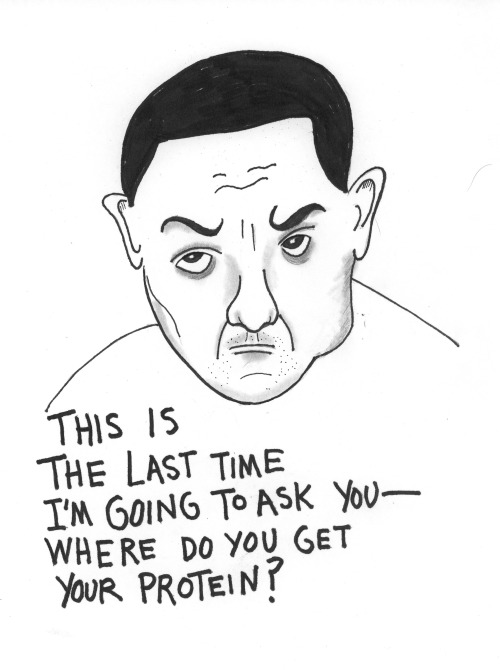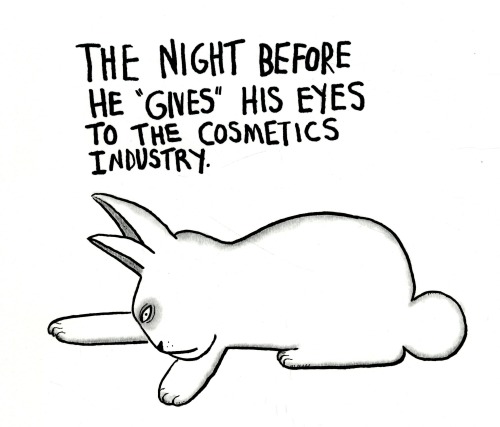
Wherever you go, vegan, you’ll hear the same question:
In Turkey: Nerede sizin protein, alabilirim? Or in Holland: Waar je je eiwitten? Or in Mexico: De donde obtiene su protein? WHERE DO YOU GET YOUR PROTEIN? There are so many smart-ass answers to that question, the mind reels:
From beer.
I chew on my fingernails.
It’s amazing how much protein there is in tree bark.
From drinking my own urine.
Bragg’s Aminos
Hershey’s dark chocolate.
Mostly from TV.
From licking my windshield in the morning.
Perhaps a better response would be to answer a question with a question, Socratic style: How much protein do you think you need?
Of course, practically nobody knows, but most people think they must eat some meat or cheese or fish or eggs with every meal in order to get enough protein. It’s the terror that has swept America: not having enough protein.
It’s been estimated that most Americans get about half of their calories from animal foods and about half come from highly processed foods like chips, cookies, sodas, candy and oil. So if that’s everybody’s diet, what are you, Ms. “plant-based, low-fat, whole foods diet,” eating, for god sakes?
Figuring out what a vegan might eat on a daily basis defies most people’s imagination. So they figure we vegans must be starving.
But wait a minute, we don’t look like we’re starving. Then we must secretly be suffering from an invisible lack of protein possibly coupled with a lack of junk food. Maybe vegans have kwashiorkor, which is the medical term for protein deficiency. (So far, there’s no medical term for ‘lack of junk food.’)
The thing is, the symptoms of kwashiorkor are anything but subtle – the skin and hair turn a reddish orange. People with the ailment also suffer from diarrhea, weakness, apathy, fatigue. When you see pictures of starving children with their stick-like legs and their bulging abdomens, you’re seeing kwashiorkor. The children are suffering from a severe lack of calories first and foremost.
If you’re consuming enough calories it is most likely that you’re consuming enough protein, even if all those calories are coming from plants.
Back to the original question: how much protein do you think you need? The answer kind of depends on who you ask. If you ask the United States government, you will hear 56 grams for men and 46 grams for women. If you ask the World Health Organization, you’ll hear 38 grams for men and 29 grams for women.
A generous bowl of cooked oatmeal will give you 12 grams of protein. A piece of whole wheat bread will give you 4 grams. A cup of cooked lentils will give you 16 grams. Two tablespoons of peanut butter will give you 8 grams. There are 8 grams of protein in a cup of cow’s milk and 8 grams of protein in a cup of soy milk. See where I’m going here? It’s not hard to get enough protein eating plants.
Whoa! you say. What was that about plant protein being an incomplete protein?
While both animal foods and plant foods have all the essential amino acids, some plant foods are low in specific essential amino acids. http://www.cdc.gov/nutrition/everyone/basics/protein.html The Center for Disease Controls recommends that vegans and vegetarians combine different plant foods, such as rice and beans or peanut butter and bread. Dr. John McDougall explains that combining is fine but it doesn’t have to happen at once in the same meal! Bread on Monday and peanut butter on Friday is fine, he says.
The National Institutes of Health has said that most of us Americans eat more protein than we actually need. The NIH cautions that consuming animal protein means consuming saturated fat and LDL (the bad kind) cholesterol which is a risk factor for heart disease.
They also note for those with kidney disease, a low-protein diet is often recommended.
So there’s really no worry about protein, as long as you gnaw on some tree bark on Tuesday and lick the windshield by Friday.
— A Vicious Vegan blog post —

